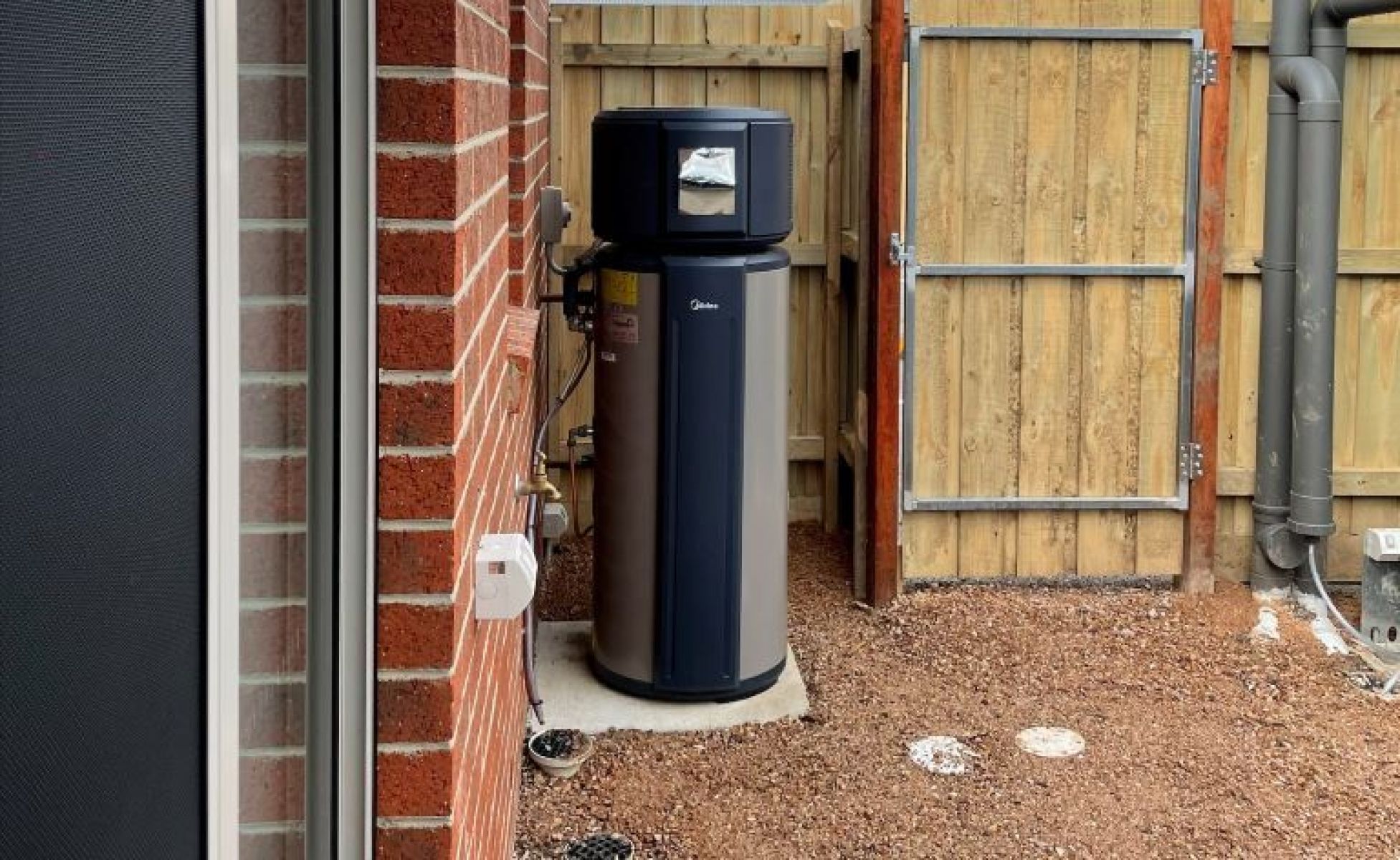One of the most common queries I hear from clients during a Scorecard assessment is about heat pump hot water systems. It goes something like this: ‘We keep hearing about heat pump hot water systems, but we don’t understand whether it’s right for us, what to choose, and who can install it. Can you help?’
As a Scorecard assessor, it is my role to demystify a range of thermal performance and appliance upgrades available to a household and help them understand which options will give them the most benefit. So I am always happy to have this conversation. In this blog post, I hope to give you the same kind of insight into what you should consider, so that you can make more informed decisions.

Why are heat pumps so efficient?
Heat pump hot water systems use electricity to power a fan in an outdoor condenser unit, which pushes air across coils containing a refrigerant. Heat from passing air is absorbed by the gas and moved inside the tank, where it heats your hot water. By collecting and moving free heat energy from outside to inside, a heat pump hot water system can use as little as ¼ of the energy that a traditional electric system would.
What factors should you consider?
All heat pump hot water systems are made up of a tank for the water storage and a condenser unit, where the fan and refrigerant in coils is housed. There are a range of differences in units which can impact your choice.
Design
A heat pump can be an integrated all-in-one system, or a split system that has a separate tank and compressor.
Split systems generally have a larger compressor which makes them a little more efficient, so they are a little faster at heating water and a little quieter. They are also often more expensive. If you need to install the tank and the compressor in different locations, you’ll need to choose a split system.
An integrated system might be best if you have limited space, as it can often be installed in the same footprint as a gas storage hot water system and it often costs less to install.

Noise
Each model will list a noise level as a decibel (dB). Generally, the more expensive units have the lowest noise level, around 37dB, while many mid-range units operate at between 42-45dB. Cheaper models often hover around 50dB. As close to 40dB as possible is a good goal for a typical installation location. If your location options are restricted and the unit will be near a bedroom or a neighbour, the quietest noise level might be a deciding factor for you.
Timer
Most units will have a timer or Wi-Fi control option that allows you to select the operation time to suit your solar generation or off-peak rates. Check whether this is the case before making your decision. If you have solar panels, you can save a lot of money by running a heat pump hot water system in the middle of the day when your solar panels are generating electricity.
Refrigerant
The compressor uses refrigerant gas to collect and move heat into your tank. Different brands of heat pumps use different refrigerants which have varying environmental, performance and cost implications.
The least environmentally damaging refrigerant if released into the atmosphere is R-744 (CO2). This is used by the highest quality brands, but this is also reflected in the significantly higher cost and may not be a viable choice for everyone. The next least damaging is R-290 (Propane), which is used in many mid-range units. Try to avoid R134 (often in low range units), because it has a high Global Warming Potential – the measure of how different greenhouse gases trap heat in the atmosphere.
Size
A good rule of thumb is to assume each person living in your home will use 50 litres of hot water per day, plus an extra 50 litres for days of heavy use. Based on this, a 300-litre system will generally provide more than a day’s hot water in a typical 4-person home. 160 litres is fine for 1 or 2 people. If you have 5 or more people, go for the largest tank, which will be 315 litres or more.
If you have guests staying and run out of hot water, don’t panic. The water in the tank will be re-heated. How long you have to wait depends on whether you have restricted heating times with the timer or whether it can just go ahead and reheat at any time. Remember, running out of water might be because you are using a shower head with a high flow rate, not your tank! Make sure you have a WELS 3-star shower head, using around 8 litres/min.
Warranty
Aim for a warranty of at least 5 years on the compressor unit, and 10 years on the tank.

Discounts and rebates
Federal government rebates or small-scale technology products (STCs) apply to a range of low, medium and high cost heat pumps. Depending on where in Australia you are located, this can be around $800 and is generally already factored into advertised pricing.
There are also other state government rebates and discounts available. If you live in the Australian Capital Territory, New South Wales, South Australia or Victoria, there are additional state rebates and discounts ranging from $500-$1200 off the cost of purchasing and installing a heat pump.
Cost
There’s no getting around the fact that installing a heat pump is generally more expensive than installing an instantaneous or storage gas system or a resistive electric system. The savings come in the running costs so it’s best to think of it as a 10-year financial investment.
Heat pumps vary significantly in cost, which translates as anywhere from $1500 to $6,000 after STC rebates. If you live in a state that offers further rebates or discounts, these can bring the cost down to under $1000 to $5000 installed.
The difference in cost reflects differences in quality of the units, including the length of warranty, efficiency, noise level, quality of hardware, quality of installation and refrigerant gas. As with most purchases, you get what you pay for. Avoiding the lower cost units may give you a better chance of owning an efficient and reliable system for years to come.
Installer
If possible, I recommend choosing an established company who has a good reputation and has qualified installers who have been installing heat pumps for a while, although these companies often only offer mid-to-high-range heat pump units. If you live in a state that offers rebates or discounts, make sure your installer can apply for the rebates for you and deduct them from your invoice. Many can apply for these discounts and rebates.

Why are heat pump hot water systems often a good choice?
Besides being really energy efficient, what are some other reasons heat pumps are increasingly being seen as the preferred choice of hot water system?
- They are an electric alternative. Gas has traditionally been a cheap source of energy compared to electricity. However, as our gas supply diminishes and prices rise across the nation, heat pumps have become an efficient electric alternative that bring us a step closer to moving off gas.
- They are great to combine with rooftop solar panels. Most heat pump units can be timed to heat water during peak solar generation times. This means if you have rooftop solar, your hot water generation could be low cost or even free. Even if you don’t have rooftop solar, you can time your heat pump to take advantage of low off-peak rates or even free electricity in some states where there is an excess of solar energy in the grid in the middle of the day.
- Even though solar hot water systems are very efficient, they require solar collector panels on the roof to heat water. By installing a heat pump hot water system, you can fill your roof space with rooftop solar and use the energy generated to run the heat pump as well as other appliances as needed.
Fun fact: You likely already have a heat pump in your home
Did you know that energy efficient heat pump technology is what powers a range of modern appliances? They include fridges, freezers and reverse cycle air conditioners. They all use heat pump technology to move heat from one place to another as needed and are all very energy efficient.
For fridges and freezers, warmth is collected from inside the units (from the food you have placed inside) and expelled outside to keep your food cool. Whereas a reverse cycle air conditioner can move heat inside to warm you. Or on a warm day, can collect heat from inside and move it outside, leaving you with cooled air inside.
Scorecard can help
If you need more help deciding the best choice for your home and situation, book a Scorecard assessment today. A friendly accredited assessor can give you personalised and easy to understand advice that suits your unique home, family and energy goals.
Article by Lucinda Flynn
Page last updated: 20/02/25